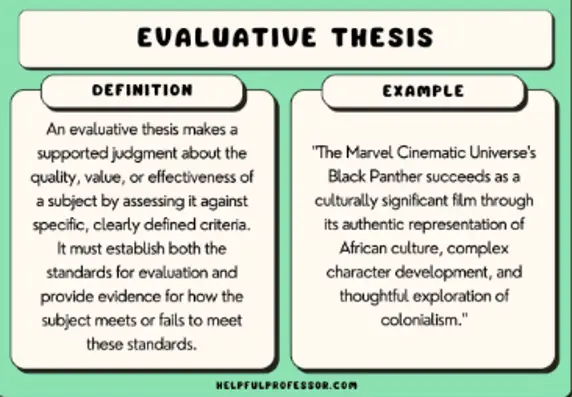Why do some essays leave a lasting impact while others fade into the background? Often, the difference lies in the strength of the thesis. In evaluative writing, whether you are reviewing a novel, critiquing a film, or analysing a public policy, a clear, focused thesis is your most powerful tool.
As per study.com, an evaluative thesis does more than introducing a topic. It takes a reasoned stance and gives a judgment based on specific, measurable criteria. It tells your readers not just what you think, but why you think it. Unlike summaries or descriptions, it demands interpretation, analysis, and critical thinking.
In this article, we’ll provide tips with practical examples to help you write an evaluative thesis that grabs attention and supports your overall argument. But first, let’s explain what are the key elements of a compelling evaluative thesis.
What are the key Features of an Evaluative Thesis?
An evaluative thesis is information that completes a judgment about a matter and equips logic or criteria to defend that judgment. It is normally employed in scholarly analysis, reviews, and argumentative essays.
Here are the key elements of a strong evaluative thesis:
1. Clear and Precise Judgment
A good evaluative thesis describes the evaluation or analysis of the issue. The thesis statement should not be sketchy or indefinite. It must offer a conclusive and clear assessment of the subject matter presented in the entire piece. A vague thesis may lead to a wimpy and weak argument that lacks emphasis. In case you fear your thesis statement is formless and weak, you can seek essay writing help online from professionals.
Example:
- Weak: “The novel ‘City of Girls’ is a pleasing book.”
- Strong: Gilbert’s City of Girls remains a strong commentary of societal norms, freedom and human essence due to its compelling characters, principled depth, and chronological relevancy.
2. Well-Defined Criteria
An effective evaluative thesis is built upon clear criteria that justify the judgment. These criteria provide the foundation for your argument and help readers understand the basis of your evaluation. Without specific criteria, an evaluation may seem arbitrary or biased. The criteria should be chosen based on the subject being evaluated. For example, if evaluating a novel, the criteria may include character development, narrative structure, and thematic depth.
Example:
- “The success of The Great Gatsby as a critique of the American Dream stems from its rich symbolism, complex characters, and tragic narrative arc.”
Here, the evaluation is not only stated but also backed by three specific criteria, allowing for a structured analysis.
3. Strong Supporting Evidence
A thesis statement should be backed by evidence that supports the evaluation. This evidence can come from textual analysis, expert opinions, data, or logical reasoning. A well-supported thesis makes an argument more convincing and credible. Without sufficient evidence, the evaluation may appear to be based on personal preference rather than objective analysis.
Example:
- “Christopher Nolan’s Inception is a masterpiece of modern cinema due to its intricate narrative structure, groundbreaking visual effects, and profound philosophical themes.”
Each of the criteria mentioned (narrative structure, visual effects, and philosophical themes) should be supported with examples from the film, such as its non-linear storytelling, use of CGI, and thematic exploration of reality and dreams.
4. Balance of Objectivity and Subjectivity
While an evaluative thesis presents a judgment, it should be grounded in a fair and reasoned assessment rather than personal bias. A strong thesis maintains a balance between objective analysis and personal evaluation. This means using logical reasoning and supporting evidence rather than making sweeping claims based on emotion.
Example:
- “Shakespeare’s Hamlet remains one of the most psychologically complex tragedies in literature due to its exploration of existential dread, moral ambiguity, and the human psyche.”
This thesis is evaluative, but it also presents a logical basis for the judgment, making it persuasive rather than subjective.
5. Debatable and Defensible Statement
A strong thesis should invite discussion rather than state an obvious fact. It must be defensible through logical arguments and evidence. A thesis that merely states an accepted fact does not contribute to academic discourse. Instead, it should provoke critical thinking and debate.
Example:
- The Harry Potter series exceeds standard fiction literature by redefining ethical themes, fostering deep character growth, and creating an immersive world.
8 Invaluable Tips to Write a Winning Evaluative Thesis
Writing an evaluative thesis is more than just conveying your statements. It’s about making a supported, firm and clear judgment. Whether you evaluate a film, policy, novel or product, the following tips will help you write a strong, persuasive and descriptive evaluative thesis.
1. Pick a Clearly Defined Topic
Your thesis should concentrate on a distinct issue that permits for thorough evaluation. Don’t use overly general or obscure topics. A comprehensive and detailed topic makes it challenging to deliver a straightforward assessment, while a particular topic permits for an attentive and influential argument.
Example: Instead of assessing the role of technology in business, focus on the impact of social media on young individuals’ mental health.
2. Establish Objective Criteria
Depict the criteria you will employ to assess your subject matter. These criteria must be rational and appropriate to the evaluation. If standards are not specified, the evaluation may seem limited or undeveloped.
Example: If assessing a movie, the measures may contain scriptwriting, cinematography, and character evolution.
3. Make an Absolute Judgment
Stating your stance clearly is fundamental to making your thesis strong and influential. Avoid unenthusiastic or tentative statements that do not direct the reader. A strong thesis must contain a firm point of view that should be maintained throughout the entire piece of writing.
Example: Instead of “This movie has good and bad aspects,” say, “Despite its strong visuals, the film’s weak storytelling undermines its impact.”
4. Use Concise and Direct Language
A strong thesis avoids unnecessary complexity and wordiness. Be precise and to the point. A concise thesis is easier for readers to understand and follow.
Example: “Modern reality TV promotes unrealistic beauty standards, leading to increased body dissatisfaction among young viewers.”
5. Support Your Judgment with Evidence
Base your evaluation on solid reasoning, facts, or expert opinions. Avoid unsupported personal opinions.
Example: If evaluating a novel, provide specific examples from the text that support your claims about character development or themes.
6. Revise for Clarity and Strength
Clarity is one of the most important elements that guarantee the success of every written piece, no matter whether it’s an essay, movie review or research paper. To make your evaluative thesis clear, refine your thesis numerous times to confirm it is clear, convincing, and free of obscurity. Writing multiple drafts can help you refine your statement and opinions and make your essay more influential and effective.
7. Avoid Overly Subjective Language
To craft a strong evaluative thesis, use analytical and balanced language rather than overly emotional or opinionated wording. Emotional language can weaken an argument by making it appear biased rather than reasoned.
Example: Instead of “This is the most terrifying movie ever created,” say, “This film’s fragile character development and flimsy plot fail to entertain audiences.”
8. Align with Your Essay’s Structure
Assure your hypothesis aligns with the format of your essay and delivers a roadmap for your opinion. A persuasive thesis should naturally guide the organisation of the essay, ensuring that each body paragraph supports the main evaluation. By including these key elements, you can formulate a strong evaluative thesis that forms a persuasive basis for your analysis or critique.
Whether evaluating literature, films, or policies, a well-structured thesis will enhance the clarity and impact of your argument. But the real problem is that many students fail to construct a strong thesis, which governs the whole essay. In such cases, they often prefer to contact trustworthy essay writing companies in the UK. These services ensure the students get expert assistance to secure their desired grades.
Evaluative Thesis Example
Here is a clear example of evaluative thesis statements across different topics:

Image Source: Helpfulprofessor.com
What is the Difference Between an Explanatory Thesis and Versus Evaluative Thesis?
An explanatory thesis presents a neutral statement that informs or explains a topic without taking a stance. It simply outlines the subject and the key aspects that will be discussed in the essay. For example, “The rise of social media has influenced communication, marketing, and politics.” In contrast, an evaluative thesis makes a judgment about a subject based on specific criteria.
It presents a clear stance and supports it with evidence. For example, “Social media has negatively impacted interpersonal communication by reducing face-to-face interactions and fostering superficial relationships.” An evaluative thesis is more argumentative and requires justification.
Final Verdict
A strong evaluative thesis is essential for crafting compelling analytical or argumentative essays. By incorporating clear judgment, well-defined criteria, supporting evidence, and a structured argument, writers can create an impactful thesis.
Following the above-discussed key features and practical tips with examples, students can write a strong and influential evaluative thesis.
Whenever writing a good evaluative thesis, try to present your argument with supporting material and science-backed evidence that will help you come up with a solid idea.
